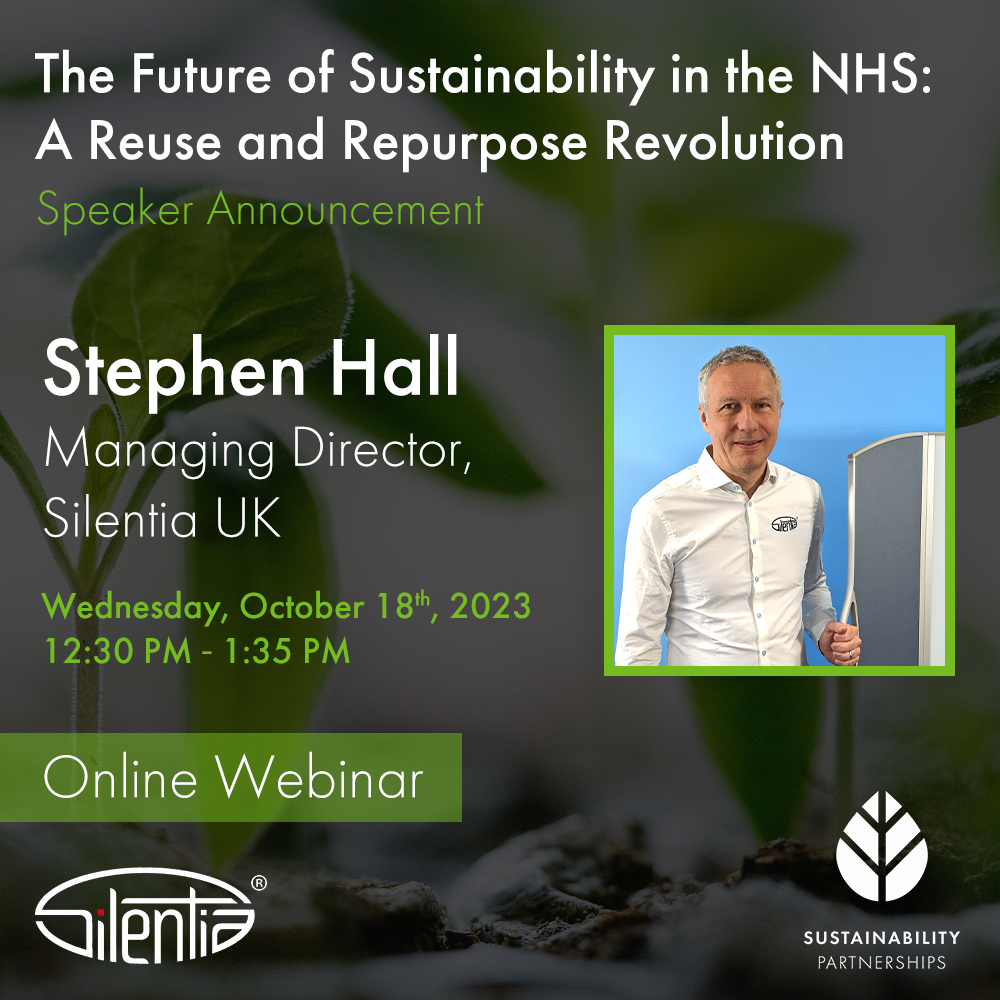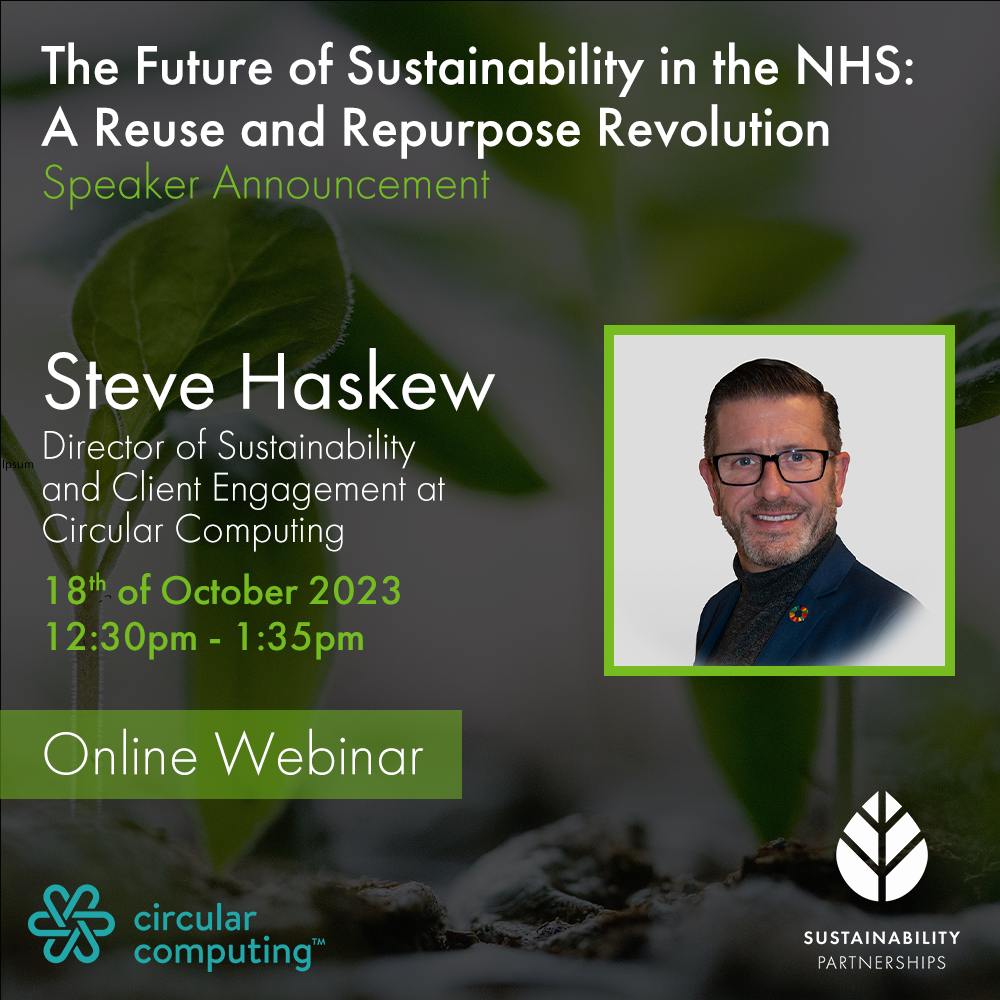The Future of Sustainability in the NHS: A Reuse and Repurpose Revolution
In this webinar, we've brought in experts and businesses who've got ideas to make the NHS more sustainable by reusing and repurposing.
The NHS' supply chain is responsible for 66% of its total carbon emissions. Being one of the world's largest organisations, the NHS must lead in sustainability, particularly given the challenges of rising costs, growing demand, and environmental pressures in healthcare worldwide. To address these issues, the NHS can leverage two key strategies: reuse and repurposing.
So, what's the plan? How can hospitals start reusing and repurposing products?
Introducing our Esteemed Speakers:
Stephen Hall, Managing Director of Silentia UK
Stephen Haskew, Group Director of Sustainability & Client Engagement Lead at Circular Computing
Matt Greenhill, Senior Sustainability Consultant at WRM
Joann Stockdale, Specialist Inventory Manager, Receipts & Distribution for Leeds Teaching Hospitals NHS Trust
An Introduction to Silentia UK
Stephen Hall kicked us off with an introduction the Silentia UK. Since 1990, Silentia has been a pioneer in patient privacy. We create innovative solutions that not only lower the risk of infections but also cut down on waste and energy use, making the environment cleaner. As the healthcare industry increasingly prioritises resource efficiency, Silentia continues its dedication to providing hospitals with sustainable patient privacy solutions.
Stephen took us through some of the eco-design principles for future-proofing patient privacy. Stephen then showcased some of the amazing results of the hospitals they’ve worked with before.
Finally, Stephen wrapped up his presentation by walking us through how Silentia UK are working towards net zero manufacturing.
“Studies have shown 93% of privacy curtains are contaminated after one week of laundering. So that means that some are becoming contaminated almost as soon as they’re installed.”
Sustainable IT… the future is unkNOWn
Next, we heard from Steve Haskew. Circular Computing is a remanufacturer of laptop technology and an innovator in the emerging circular economy space. Steve discussed the principles of the circular economy, highlighting the need to shift away from our current consumption patterns characterised by rapid and unsustainable product turnover.
He emphasised that reusing devices instead of manufacturing new ones can significantly reduce CO2 emissions and pointed out the substantial water footprint associated with creating laptops. Circular Computing's commitment to sustainability includes reforestation efforts, as they plant five trees for every laptop they sell, demonstrating a holistic approach to reducing environmental impact and promoting a more eco-conscious future. Steve's presentation served as a compelling call to action for embracing circular economy practices and supporting companies committed to environmental responsibility.
“If we’re able to reduce how much stuff we make from factories that consume fossil fuels, then going to reduce our CO2 and our ambition is to move to a net zero and rely on a heavily circular economy”
Centralisation, Circularity & Sustainability at NHS Leeds Teaching Hospitals
We then heard from Matt Greenhill, who is currently seconded to Leeds Teaching Hospitals as an in-house sustainability support and manager. Matt's role involves providing strategic advice and support to organisations to reduce their carbon footprints and foster sustainability. His primary focus lies in supporting NHS trusts and suppliers.
During his presentation, Matt introduced the innovative concept of Dolly Lane, a centralised hub designed to streamline and enhance the efficiency of goods deliveries to multiple hospital sites while reducing their environmental impact. This smart logistics approach eliminates the need for individual suppliers to deliver directly to each hospital site. Instead, goods are consolidated and transported to Dolly Lane using a seven-tonne truck. Subsequently, electric vehicles are used to distribute these goods to the hospital sites, resulting in a significant reduction in the number of annual deliveries.
Dolly Lane doesn't stop at just optimising logistics; it also plays a crucial role in sustainability. They take responsibility for the recycling of packaging materials. Cardboard is processed into half-tonne blocks, and waste plastic is compressed for reuse in fresh packaging for the hospital's procured products.
After introducing Dolly Lane, Matt walked the audience through how WRM has calculated the carbon impact of this entire process, shedding light on the remarkable environmental benefits this innovative system brings to the table.
Finally, Matt handed the mic over to Joann Stockdale to provide us with a great insight into how things are currently working at Dolly Lane and the future ambitions of NHS Leeds Teaching Hospitals. Joann currently works across warehousing and manages all receipts in a newly centralised location. She also manages PPE and sterile services pick and pack, with onward delivery to end users.
Wrapping Up
As always, Georgia opened the panel up to a Q&A from our audience.
What to learn other ways in which the NHS can become more sustainable? Explore our upcoming events here.



